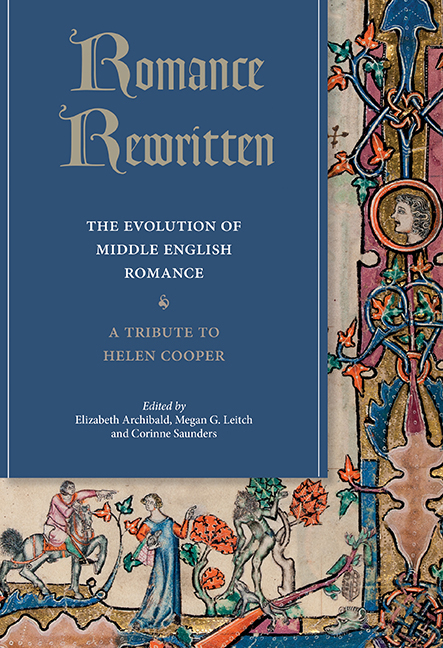Book contents
- Frontmatter
- Dedication
- Contents
- Notes on Contributors
- Acknowledgements
- Introduction. Middle English Romance: The Motifs and the Critics
- I Romance Disruptions
- II Romance and Narrative Strategies
- III Romance and Spiritual Priorities
- IV Late Romance
- 11 The Intelligence of The Court of Love
- 12 The Squire of Low Degree and the Penumbra of Romance Narrative in the Early Sixteenth Century
- 13 Contested Chivalry: Youth at War in Walter Scott and Charlotte M. Yonge
- Works Cited
- Index
- Volumes Already Published
11 - The Intelligence of The Court of Love
from IV - Late Romance
Published online by Cambridge University Press: 17 October 2019
- Frontmatter
- Dedication
- Contents
- Notes on Contributors
- Acknowledgements
- Introduction. Middle English Romance: The Motifs and the Critics
- I Romance Disruptions
- II Romance and Narrative Strategies
- III Romance and Spiritual Priorities
- IV Late Romance
- 11 The Intelligence of The Court of Love
- 12 The Squire of Low Degree and the Penumbra of Romance Narrative in the Early Sixteenth Century
- 13 Contested Chivalry: Youth at War in Walter Scott and Charlotte M. Yonge
- Works Cited
- Index
- Volumes Already Published
Summary
Many readers may know The Court of Love only by reputation. I first came across it in C. S. Lewis's Allegory of Love, where it appears in the chapter ‘Allegory as the Dominant Form’, which concerns itself with poems that came late in the tradition of medieval love allegory. The general problem with the latecomer, C. S. Lewis notes, is its tendency to trot out the tired conventions of the genre: ‘its characteristics are formalized. A stereotyped monotony, unnoticed by contemporaries but cruelly apparent to posterity, begins to pervade it.’ Many critics think that The Court of Love exemplifies these vices, but whether Lewis himself did so is not altogether clear. He certainly thought it was a very late composition. The poet, he says, ‘had read widely in the literature of courtly love, with the detachment of one studying a mode that has almost passed away’, but he also says the poem is ‘a lively piece, full of movement and gaiety’. How this fits in with his view of the poet as a detached latecomer we shall never know, because on this note the discussion of The Court of Love ends.
My purpose in this essay is to develop C. S. Lewis's words of praise for The Court of Love, and to make the case that it is an exuberantly witty poem and a genuine tour de force of allegorical writing – and this not in spite of its lateness but by virtue of it. Coming late in a tradition also makes things possible: it puts at the disposal of writers the resources of a rich poetic legacy and it gives them scope to pay tribute to literary predecessors by means of self-conscious imitation of their qualities. In the sections that follow I would like to take readers through the main episodes of The Court of Love, with the aim of showing both the closeness of the poet's engagement with his sources and his independence from them.
Because The Court of Love is not very well known, however, I want to begin with two basic questions about the poem: when was it written and by whom? Walter Skeat, who provided the first proper edition of the poem, had a wild theory (which he doggedly pursued in his notes) that the poem was a Renaissance product, and this ‘fact’ has often been repeated since.
- Type
- Chapter
- Information
- Romance RewrittenThe Evolution of Middle English Romance. A Tribute to Helen Cooper, pp. 209 - 228Publisher: Boydell & BrewerPrint publication year: 2018



